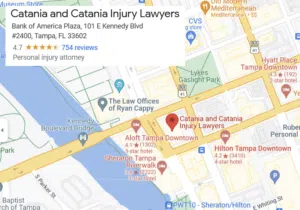
Many states require motorists to purchase at-fault insurance, also known as liability insurance coverage. However, more than a dozen states require drivers to purchase no-fault insurance. Less than a handful of states have what they call “choice” no-fault laws that allow drivers to choose between a no-fault or at-fault insurance policy.
Florida is a no-fault car insurance state. However, state law includes an exception that allows some accident victims to sue an at-fault driver for damages caused by a car accident.
Table of Contents
What Are the No-Fault Insurance Requirements in Florida?
Florida law requires drivers to purchase a minimum of $10,000 in Personal Injury Protection (PIP) coverage. PIP coverage is a form of no-fault insurance. Drivers must also purchase a minimum of $10,000 of Property Damage Liability (PDL) insurance coverage, which is liability coverage for property damage you cause to another person’s vehicle.
How Do PIP No-Fault Insurance Claims Work in Florida?
No-fault insurance coverage pays benefits regardless of who caused a car accident, hence “no fault.” So you would file a claim with your PIP insurance provider even if another driver caused your crash.
Under basic PIP plans, you can receive compensation for up to 80 percent of your necessary and reasonable medical bills. PIP coverage also pays up to 60 percent of your lost wages. However, the total benefits cannot exceed the policy limits.
Florida Statute §627.726 sets the rules for seeking medical attention after a car accident. You must seek medical care within 14 days of the car crash to receive PIP benefits. If you do not seek treatment for your injuries within 14 days, your insurance provider can deny your claim.
If you seek prompt medical treatment after your crash, the insurance company should pay your medical bills up to the policy limits. However, if you do not have an emergency medical condition, you can only receive up to $2,500 for your medical expenses.
The terms and conditions of your PIP insurance policy determine how long you have to file a PIP claim in Florida. There could be other conditions and terms that you must follow to be eligible for PIP benefits. Drivers should read and understand the PIP insurance policy to ensure they receive benefits if they are injured in a car accident.
PIP insurance does not cover all damages caused by an automobile accident. However, the advantage of no-fault insurance coverage is that you receive benefits quickly, even if you caused the car crash.
Generally, Florida does not permit accident victims to sue for damages. Instead, they are limited to the benefits paid by their no-fault insurance. However, there are exceptions for individuals who sustain serious injuries as defined by statute.
How Do At-Fault Insurance Claims Work?
At-fault or liability insurance coverage is not required under Florida state law. However, drivers may choose to purchase bodily injury liability car insurance. The reason is that accident victims who sustain serious injuries may file injury claims with the at-fault driver’s insurance company if the driver has liability insurance coverage.
The benefit of purchasing liability car insurance is it will pay for the damages resulting from a car accident that is your fault. Otherwise, the other driver might sue you for damages. If they obtain a personal judgment, they can take legal action to collect that judgment through wage garnishment or seizing assets.
If you caused a car accident that resulted in serious bodily injury, the victim files a claim with your liability insurance provider. Your insurance company will investigate the accident to determine if you were at fault. If the insurance company accepts liability, it will compensate the victim for damages according to your policy limits.
Damages that may be paid by liability insurance include:
- Past and future medical bills
- Costs of long-term nursing care or personal care
- Out-of-pocket expenses
- Loss of income and benefits
- Mental anguish and emotional distress
- Future lost wages
- Physical pain and suffering
- Decreased quality of life and loss of enjoyment of life
- Diminished earning capacity
- Permanent disabilities, impairments, and disfigurement
A driver who causes an accident with serious injuries is responsible for the victim’s economic damages and non-economic damages. No-fault insurance does not compensate you for the pain and suffering caused by the accident. However, liability insurance claims include these important (and valuble) damages.
If an insurance company disputes liability or refuses to negotiate a settlement agreement, the accident victim may file a lawsuit. Generally, the insurance company hires an attorney to defend the lawsuit. However, the attorney works for the insurance company, so they may not have your best interest in mind when handling the lawsuit.
If the jury awards the victim an amount that exceeds your insurance policy limits, you are personally liable for the amount your insurance company does not cover.
Contact a Tampa personal injury lawyer to discuss whether you qualify for compensation after an accident.




